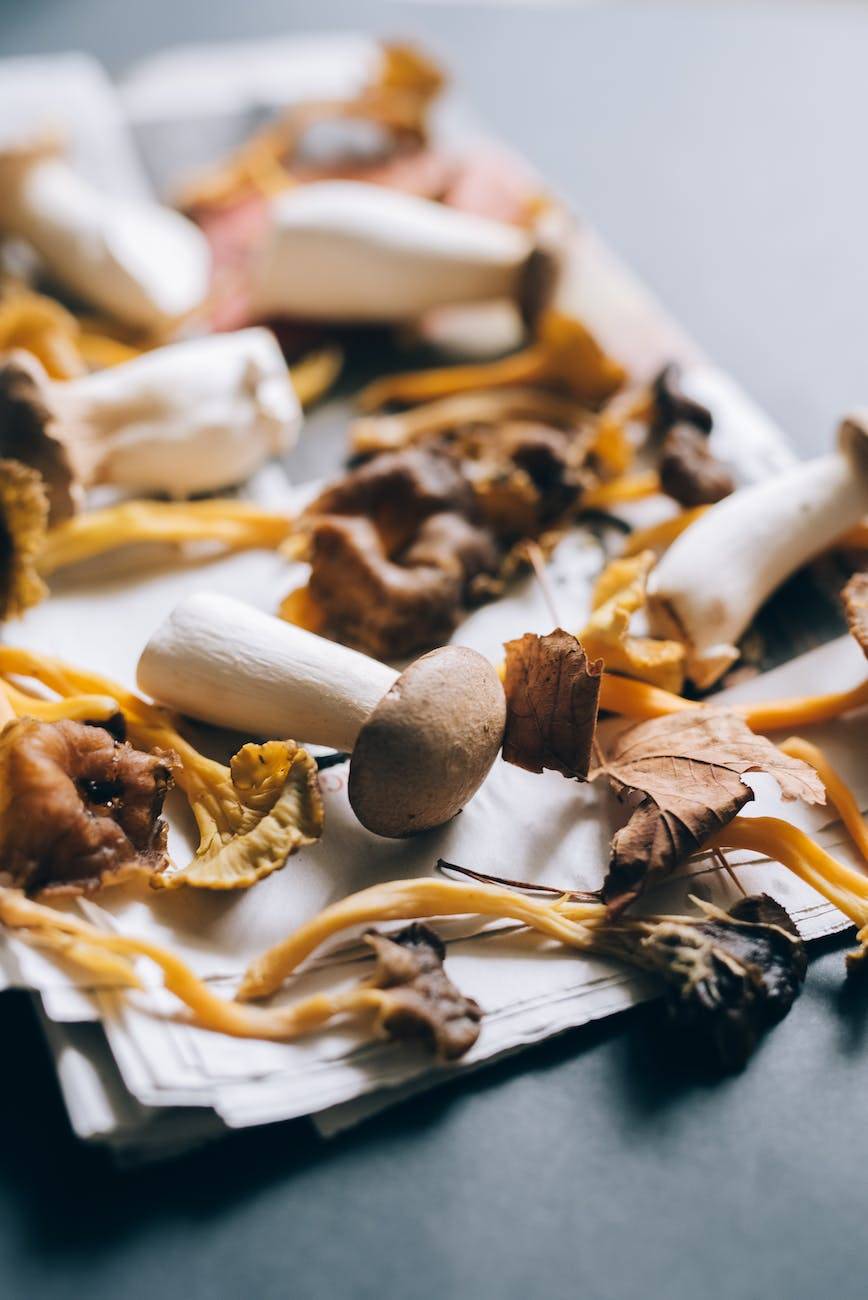Understanding Lion’s Mane Mushrooms
Before delving into the benefits of dried lion’s mane mushrooms, it is essential to grasp an understanding of the mushroom itself. Its peculiar name, origin, habitat, and distinct flavor all contribute to its unique identity.
Origins and Habitat
Lion’s mane mushroom, scientifically known as Hericium Erinaceus, originates from North America, Europe, and Asia. It is prevalent throughout the Northern United States and Canada. The mushroom is often found growing on dead and decaying trees, as well as on birch, beech, elm, and oak trees. This information is according to Real Mushrooms, which provides insightful details about various types of mushrooms.
Lion’s mane mushrooms have a rich history in Asian medicine. Traditionally, they have been used to support spleen and gut health, promote good digestion, vigor, and strength. This usage signifies the long-standing recognition of these mushrooms’ potential health benefits.
Appearance and Flavor
Lion’s mane mushroom is named after its unique appearance, which resembles a lion’s mane. The name is indicative of its physical characteristics, making it easily identifiable among other mushrooms.
In terms of flavor, lion’s mane mushrooms have a succulent taste, often compared to the flavor of seafood, specifically crab or lobster. The texture of the mushroom is tender and chewy, adding to its culinary appeal.
In the following sections, we will delve deeper into the nutrient profile of lion’s mane mushrooms, its health benefits, its use in traditional medicine, and how to use it in its dried form. Stay tuned to discover more about dried lions mane mushrooms.
Lion’s Mane Mushroom Nutrient Profile
Lion’s mane mushrooms, whether in fresh or dried form, are rich in nutrients and contain unique compounds that contribute to their health benefits.
Essential Nutrients
Lion’s mane mushrooms are packed with essential nutrients that the body needs for optimal function. These include proteins, carbohydrates, fibers, and a variety of vitamins and minerals. Although the exact nutrient content can vary depending on the growing conditions and preparation methods, consuming lion’s mane mushrooms can contribute to a balanced and nutritious diet.
| Nutrient | Amount (per 100g) |
|---|---|
| Protein | 3g |
| Carbohydrates | 22g |
| Fiber | 2g |
| Vitamin D | 2% of Daily Value |
| Potassium | 4% of Daily Value |
These figures are estimates and actual values may vary. Always refer to product packaging for precise nutritional information.
Unique Compounds in Lion’s Mane
In addition to the essential nutrients, lion’s mane mushrooms contain unique compounds that are believed to have a range of health benefits, particularly for brain health. These compounds include erinacines and hericenones, which have been shown to stimulate the growth of brain cells and enhance brain function.
Erinacines and hericenones are found in high concentrations in the fruiting body and mycelium of the mushroom. Studies have shown that these compounds may have neuroprotective effects and could potentially protect against Alzheimer’s disease and other neurodegenerative disorders (Healthline).
Moreover, these compounds have the potential to protect the brain from cognitive decline associated with aging (Real Mushrooms).
| Compound | Potential Health Benefit |
|---|---|
| Erinacines | Stimulates growth of brain cells, enhances brain function |
| Hericenones | Protects against neurodegenerative diseases |
The nutrient profile of lion’s mane mushrooms makes them a valuable addition to a healthy diet. Rich in essential nutrients and unique compounds, these mushrooms can provide a range of health benefits, particularly for brain health. Whether consumed fresh or as dried lion’s mane mushrooms, they are a versatile and nutritious ingredient that can be incorporated into a variety of dishes.
Health Benefits of Lion’s Mane Mushrooms
Lion’s Mane mushrooms, especially in their dried form, have been gaining recognition for their potential health benefits. From cognitive enhancements to anti-inflammatory and antioxidant effects, let’s delve into the potential health benefits of dried lions mane mushrooms.
Cognitive Enhancements
Lion’s mane mushrooms have a rich history of use in traditional Chinese medicine, where they were consumed for their ability to support brain health and cognitive function. The mushrooms contain compounds called erinacines and hericenones, which have been shown to stimulate the growth of brain cells and enhance brain function (Healthline).
One of the most compelling aspects of lion’s mane mushrooms is their potential neuroprotective effects. Studies have shown that they could potentially help protect against Alzheimer’s disease and other neurodegenerative disorders. This protective effect is believed to be due to the unique compounds present in Lion’s Mane mushrooms that promote the growth of brain cells.
Anti-inflammatory and Antioxidant Effects
Lion’s mane mushrooms are not just beneficial for brain health. They also have potent anti-inflammatory and antioxidant properties. These properties can help in reducing inflammation in the body and fighting off oxidative stress, which is a key contributor to chronic diseases and aging.
Mental Health Improvements
The potential health benefits of lion’s mane mushrooms extend to mental health as well. One study found that lion’s mane extract helped reduce symptoms of anxiety and depression in mice. This is potentially due to the mushroom’s ability to reduce inflammation and oxidative stress, which are thought to play a role in mental health disorders.
While more research is needed, these early findings suggest that lion’s mane mushrooms could be a promising natural treatment for mental health conditions. As always, it’s important to consult with a healthcare professional before starting any new supplement regimen.
From boosting brain health to potentially improving mental wellbeing, the potential health benefits of dried lions mane mushrooms are wide-ranging. As research continues, we may uncover even more reasons to include these powerful mushrooms in our diet.
Lion’s Mane Mushrooms in Traditional Medicine
The usage of lion’s mane mushrooms extends far beyond its recent popularity in the world of health supplements. This unique fungus has a rich history in traditional medicine, particularly in Chinese practices. To fully appreciate the value of dried lions mane mushrooms, it’s important to understand their roots in medicinal usage.
Role in Chinese Medicine
Lion’s mane mushrooms have been used in traditional Chinese medicine for centuries, and have been prized for their potential health benefits (Healthline). They were used to support brain health and cognitive function, emphasizing their role in promoting mental clarity and focus.
Beyond cognitive support, lion’s mane mushrooms have also been traditionally used to aid in spleen and gut health, promoting good digestion, vigor, and strength. This highlights the comprehensive wellness approach often found in traditional Chinese medicine, where a single ingredient serves multiple health-enhancing purposes.
Modern Applications
In modern times, the potential health benefits of lion’s mane mushrooms have been recognized and studied extensively. Today, they’re commonly used for their potential to improve cognitive function and reduce inflammation.
Recent research suggests that lion’s mane mushrooms may support the immune system, offering another layer of potential benefits (Amazon). This aligns with the holistic perspective of traditional Chinese medicine and reaffirms the mushroom’s status as a versatile health supplement.
The modern application of lion’s mane mushrooms in health supplements often involves using the dried or dehydrated lions mane form. This allows for easy storage and long-term use, making it a convenient addition to a daily health routine.
It’s important to remember that while lion’s mane mushrooms offer numerous potential health benefits, they should be used as part of a balanced diet and healthy lifestyle. Always consult with a healthcare provider before starting any new supplement regimen.
Using Dried Lion’s Mane Mushrooms
Incorporating dried Lion’s Mane mushrooms into your diet can be a great way to enhance your health. In this section, we will explore their culinary uses as well as provide tips for rehydrating these dried mushrooms.
Culinary Uses
Lion’s Mane mushrooms can be enjoyed in a variety of ways. You can have them raw, cooked, dried, or steeped as a tea. They are often used in supplement form for health support.
Cooking with Lion’s Mane mushrooms is a fantastic way to add more nutrients to your diet. They are a complete source of all essential amino acids, have a low-fat content, and a high proportion of polyunsaturated fatty acids. This makes them not only a healthy choice but also a flavorful addition to various dishes (Real Mushrooms).
These dried Lion’s Mane mushrooms are gourmet grade and are sourced from the pristine mountain forests of the Pacific Northwest. They are carefully hand-picked and naturally dried to preserve their flavor and nutritional value (Amazon).
In the kitchen, these dried Lion’s Mane mushrooms can be used in various culinary preparations such as stir-fries, soups, stews, and sauces. They add a unique texture and flavor to dishes and are a favorite among vegan and vegetarian cooks. For more ideas on how to use dried Lion’s Mane mushrooms in your meals, visit our dried lions mane mushroom page.
Rehydrating Dried Mushrooms
Before using dried Lion’s Mane mushrooms in your cooking, they need to be rehydrated. The process is fairly simple:
- Place the dried mushrooms in a bowl.
- Cover them with warm water.
- Let them soak for about 30 minutes, or until they are soft and pliable.
- Once rehydrated, rinse the mushrooms thoroughly to remove any remaining grit.
- Squeeze out the excess water, and they’re ready to use!
The soaking water can also be used in your cooking, as it will have absorbed some of the mushroom flavor. Just make sure to strain it first to remove any grit.
Remember, rehydrating dried Lion’s Mane mushrooms not only softens them for cooking but also activates their unique compounds, enhancing their health benefits. For more tips on using dried Lion’s Mane mushrooms, visit our dried lions mane page.
Potential Side Effects and Precautions
While dried lions mane mushrooms offer numerous health benefits, it’s important to be aware of potential side effects and precautions associated with its consumption.
Known Side Effects
Generally speaking, lion’s mane mushroom is considered safe for most people. However, like any food or supplement, it may cause allergic reactions in some individuals. Symptoms might include skin rash, difficulty breathing, and dizziness.
Moreover, because of its potential effects on brain function and mood, individuals with mental health disorders should consult a healthcare professional before starting to include lion’s mane into their diet.
Who Should Avoid Lion’s Mane Mushrooms
While lion’s mane mushrooms are generally safe for most people, some should exercise caution. Pregnant and breastfeeding women, for instance, should consult a healthcare provider before using lion’s mane, as there hasn’t been enough research to determine its safety for these populations.
Similarly, people who are allergic to mushrooms should avoid lion’s mane to prevent potential allergic reactions. Individuals with a known medical condition or those taking any medication should also consult with their healthcare provider before incorporating this mushroom into their diet.
Finally, since lion’s mane mushrooms may lower blood sugar levels, individuals with diabetes or those taking medications for blood sugar control should monitor their blood sugar levels closely.
In conclusion, while lion’s mane mushrooms can offer a plethora of health benefits, it’s important to consume them responsibly. Always consult with a healthcare professional if you have any doubts or concerns about incorporating dried lions mane mushrooms into your diet.




Leave a Reply